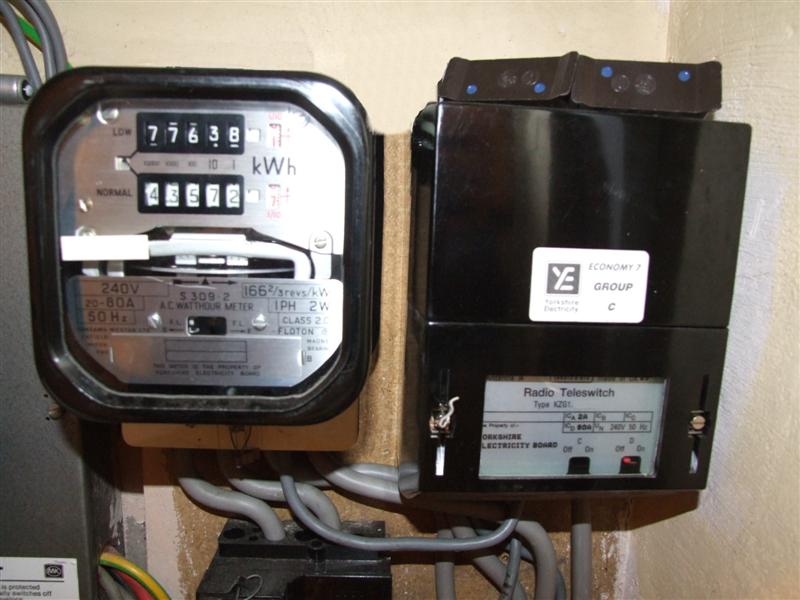Powerful programming: BBC-controlled electric meters are coming to an end
Imagine the conspiracy theories in the US
Powerful programming: BBC-controlled electric meters are coming to an end
Customers are being pushed to smart meters that have their own signal problems.
Kevin Purdy
–
Apr 11, 2025 1:43 pm
|
45
An Economy 7 meter and accompanying Radio Teleswitch.
Credit:
Richard Harvey (Public domain)
An Economy 7 meter and accompanying Radio Teleswitch.
Credit:
Richard Harvey (Public domain)
Story text
Size
Small
Standard
Large
Width
*
Standard
Wide
Links
Standard
Orange
* Subscribers only
Learn more
Radio signal broadcasts have their usefulness, but they eventually end (except, perhaps, for SETI). Every so often, we mark the public end of a once-essential wavelength, such as 3G cellular, analog television, or the Canadian time check. One of the most weirdly useful signals will soon end in the United Kingdom, with notable consequences if its transition is not properly handled.
Beginning in the early 1980s, UK homes could have electrical meters installed with a radio teleswitch attached. These switches listened for a 198 kHz signal from the BBC's Radio 4 Long Wave service, primarily broadcast from the powerful Droitwich Transmitting Station. These switches listened to 30 messages per minute, waiting for a certain 50-bit data packet to arrive that signaled that electricity was now at cheaper, off-peak rates ("tariffs" in the UK).
With this over-the-air notice, homes that bought into Economy 7 or Economy 10 (7 or 10 hours of reduced-price power) could make use of ceramic-stuffed storage heaters that stayed warm into the day, prepare hot water heaters, and otherwise make use of off-peak power. How the electrical companies, BBC, and meters worked together is fascinating in its own right and documented in a recent video by Ringway Manchester (which we first saw at Hackaday).
Ringway Manchester's useful history of, and explainer for, the Radio Teleswitch Signal carried for decades by BBC Radio 4.
Very fragile tungsten linchpins
But BBC Radio 4's Long Wave transmissions are coming to an end, due to both modern realities and obscure glass valves.
Two rare tungsten-centered, hand-crafted cooled anode modulators (CAM) are needed to keep the signal going, and while the BBC bought up the global supply of them, they are running out. The service is seemingly on its last two valves and has been telling the public about Long Wave radio's end for nearly 15 years. Trying to remanufacture the valves is hazardous, as any flaws could cause a catastrophic failure in the transmitters.
BBC Radio 4's 198 kHz transmitting towers at Droitwich.
Credit:
Bob Nienhuis (Public domain)
BBC Radio 4's 198 kHz transmitting towers at Droitwich.
Credit:
Bob Nienhuis (Public domain)
Rebuilding the transmitter, or moving to different, higher frequencies, is not feasible for the very few homes that cannot get other kinds of lower-power radio, or internet versions, the BBC told The Guardian in 2011. What's more, keeping Droitwich powered such that it can reach the whole of the UK, including Wales and lower Scotland, requires some 500 kilowatts of power, more than most other BBC transmission types.
As of January 2025, roughly 600,000 UK customers still use RTS meters to manage their power switching, after 300,000 were switched away in 2024. Utilities and the BBC have agreed that the service will stop working on June 30, 2025, and have pushed to upgrade RTS customers to smart meters.
In a combination of sad reality and rich irony, more than 4 million smart meters in the UK are not working properly. Some have delivered eye-popping charges to their customers, based on estimated bills instead of real readings, like Sir Grayson Perry's 39,000 pounds due on 15 simultaneous bills. But many have failed because the UK, like other countries, phased out the 2G and 3G networks older meters relied upon without coordinated transition efforts.
Kevin Purdy
Senior Technology Reporter
Kevin Purdy
Senior Technology Reporter
Kevin is a senior technology reporter at Ars Technica, covering open-source software, PC gaming, home automation, repairability, e-bikes, and tech history. He has previously worked at Lifehacker, Wirecutter, iFixit, and Carbon Switch.
45 Comments


